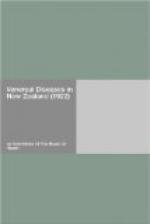In addition to the penalty for making a false statement it might be provided, as in the Queensland Act, that venereal disease shall be a ground for annulling a marriage contract when one party is suffering at the time of marriage from such disease in an infectious state, provided the other party was not informed of the fact prior to marriage.
The Committee would also recommend the adoption of a further provision that it should be the duty of a medical practitioner attending a case of venereal disease which is or is likely to become infective, if he has reason to believe that the patient intends to marry, to warn him or her against doing so, and if he or she persists it should be the duty of the doctor forthwith to notify the case by name to the Director-General of Health, whose duty it should be to inform the other party. It should also be provided that bona fide communications made in such a case, either by the Director-General of Health or the doctor, to the other party to the marriage, or to the parents or guardian of such party, shall be privileged.
SECTION 8.—TREATMENT BY UNQUALIFIED PERSONS.
The evidence given before the Committee shows that while reputable chemists refer to a medical man patients coming to them for treatment for venereal disease, and while these constitute the great majority of the profession, there are still far too many cases of venereal disease treated by chemists, herbalists, chiropractors, and other unqualified persons. The treatment of venereal disease has become a specialized branch of medicine, and many general practitioners prefer to refer such cases to experts. The result of trusting to unqualified persons for the treatment of such serious and difficult diseases is that the patient usually drifts on uncured, and serious complications may occur. One specialist in venereal disease informed the Committee that of 200 of his cases whose cards showed particulars, 104 consulted chemists in the first place and received more or less treatment from them. He was able to give details of twenty-three cases showing the type of treatment given. In several cases there were severe complications which could have been avoided by proper treatment. There were also cases in which the patient, after taking medicine for a time, had communicated the infection to others. This witness further stated that some chemists charged consultation fees in addition to charges for drugs applied, and in certain cases charges for drugs were made which were little short of blackmail.
The Committee recommend that, in place of section 7 of the Social Hygiene Act, a more comprehensive clause from the West Australian Act be adopted. This is to the following effect: “No person [other than a registered medical practitioner] should attend or prescribe for any person for the purpose of curing, alleviating, or treating venereal disease, whether such person is in fact suffering from such disease or not.”




